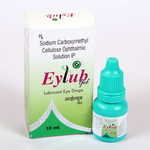Lubi 1% Eye Gel

Lubi 1% Eye Gel
Lubi 1% Eye Gel contains Carboxymethylcellulose which belongs to the class of ophthalmic lubricants and is used for treating dry eyes Its function is to mimic natural tears, providing lubrication to alleviate dryness and discomfort associated with insufficient tear production.
Carboxymethylcellulose operates similarly to natural tears, offering lubrication to the eyes. By mimicking the properties of natural tears, it helps in maintaining proper eye lubrication, reducing dryness, and enhancing overall eye comfort.
Administer the recommended eye drops to the affected eye(s) as prescribed Following the precise dosage instructions is crucial for optimal effectiveness. Any questions or concerns regarding usage should be addressed with a healthcare professional for clarification. Strictly adhering to the prescribed dosage and application instructions is essential, and eye medications should not be shared with others. If persistent discomfort or adverse reactions occur, consulting an eye care professional is advised Keep the medication out of reach of children.
Common side effects of Carboxymethylcellulose may include temporary blurred vision, mild eye irritation, burning eyes, eye discomfort, itching, and eye pain. Awareness of these potential side effects is important, and if they persist or worsen, it is recommended to inform a healthcare professional.
No special precautions are mentioned for Carboxymethylcellulose However, it is important to strictly follow the prescribed dosage, keep the medication out of reach of children, and consult an eye care professional in case of persistent discomfort or adverse reactions.
If a dose of Carboxymethylcellulose is missed, administer it as soon as remembered However, if it is almost time for the next scheduled dose, it is advisable to skip the missed one Strict adherence to the prescribed schedule ensures optimal effectiveness of the medication.
Similar Medicines
Related Faqs

What is Neofresh used for?
Neofresh is a revolutionary product designed to mimic natural tears and serve as an effective remedy for dry eyes This artificial substitute is specifically formulated to provide lubrication offering immense relief from the symptoms of dryness such as burning irritation and discomfort Whether due to environmental factors or certain medical conditions dry eyes can be a significant source of distress Neofresh aims to alleviate these issues by replenishing the moisture in the eyes ensuring optimal comfort and clarity of vision Aside from its use for dry eyes Neofresh is also highly regarded for its compatibility with contact lens wearers Both soft and rigid gas permeable lenses can benefit from this lubricating solution as it effectively rewets and nourishes the lenses promoting a comfortable and hasslefree wearing experience Additionally Neofresh addresses the common dryness irritation and discomfort that contact lens wearers may face further enhancing the overall comfort and wearability of these corrective devices In summary Neofresh is a versatile product that not only provides relief for dry uncomfortable eyes but also improves the comfort and longevity of contact lens wear Its unique formulation and effectiveness make it a goto solution for anyone seeking immediate and longlasting relief from dry eye symptoms and lensrelated discomfort

How should Isibrex Plus 1% Eye Drop be used?
For individuals experiencing dry eyes it is recommended to apply 1 or 2 drops of the solution into the affected eyes as necessary In the case of using it as a lubricant for soft and rigid gaspermeable lenses it is advised to place 1 to 2 drops into each eye while wearing the lenses following the guidance of your healthcare professional After applying the drops blinking a few times can help distribute the solution evenly

How should Lubi 1% Eye Gel be used?
When using this product to relieve dry eyes simply put 1 or 2 drops into the eye or eyes experiencing discomfort as necessary In the case of using it to lubricate both soft and rigid gaspermeable lenses apply 1 to 2 drops to each eye while wearing the lenses as instructed by your doctor After administering the drops blink a few times to ensure proper distribution If you are uncertain about the appropriate usage or have any concerns it is advisable to consult with your doctor for clarification and guidance
Related Posts

1:15
Are Your Hormones Out Of Balance? Signs & Symptoms!

1:15
Amazing Benefits of Flaxseeds | Best Way to Eat Flax Seeds Daily!

1:15
Why Is There Blood in Your Poop? Causes, Symptoms, and When to See a Doctor!

1:15
How Do You Know If You Have a Vaginal Infection? Warning Signs!

1:15
Top Health Benefits of Cinnamon | How to Use It for Better Health!
Disclaimer : This information is not a substitute for medical advice. Consult your healthcare provider before making any changes to your treatment . Do not ignore or delay professional medical advice based on anything you have seen or read on Medwiki.
Lubi 1% Eye Gel
Prescription Required
Packaging :
bottle of 10 ml Eye Gel
Manufacturer :
Apple Therapeutics Pvt LtdComposition :
Carboxymethylcellulose (1% w/v)




















.svg)
